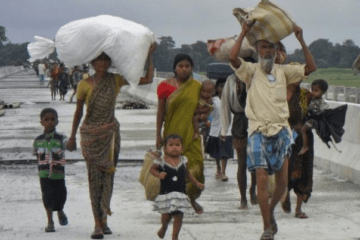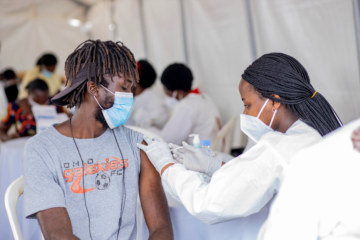This article is written by Saveri Sourabh Sharma, NMIMS Kirit P Mehta School of Law, an intern under Legal Vidhiya.
INTRODUCTION
The International Criminal Court was established to examine, punish, and trial those suspected of the most grievous international crimes like murder, crimes against humanity, war crimes, and acts of hostility. The Netherlands, specifically The Hague, is home to the Court. The Court is funded in part by the fees made by the States Parties and in part by donations from states, non-governmental groups, people, and businesses. The court can open an investigation in three ways. A member nation may report a situation that occurs on its soil to the court, the UN Security Council may refer a situation, or the prosecutor may launch an inquiry. The Rome Statute, which created the groundwork for the court, was ratified by 60 nations in 1998, leading to the creation of the ICC.
The United Nations Security Council established two similar tribunals, the International Criminal Tribunal for the former Yugoslavia (ICTY) in 1993 and the International Criminal Tribunal for Rwanda (ICTR) in 1994, both of which tried individuals for international crimes committed in specific regions.
The International Criminal Court was founded to ensure that those accountable for the gravest crimes, regardless of their socioeconomic status, would be brought to justice. Punishing them will hopefully deter them from committing similar acts in the future, and justice will remain an essential part of maintaining peace and order for the long haul.[1]
As of April 2023, 123 countries have ratified the Rome Statute.
PURPOSE OF THE ICC
The International Criminal Court’s (ICC) mission is to investigate and prosecute those responsible for the most heinous international crimes, including but not limited to genocide, war crimes, crimes against humanity, and crimes of aggression. The goal of the International Criminal Court (ICC) is to ensure that perpetrators of serious crimes are brought to justice and to help prevent future occurrences of such crimes. The International Criminal Court (ICC) is an organisation that aims to promote the rule of law via international criminal justice2. The International Criminal Court (ICC) is meant to be a court of last resort, supplementing rather than replacing national tribunals. The International Criminal Court (ICC) is the first permanent international criminal court established by an international agreement (the Rome Statute). The judges of the ICC preside over trials and ensure that they are conducted fairly. The International Criminal Court’s principal role is as a court of “last resort,” having jurisdiction over the most heinous of crimes. The International Criminal Court (ICC) contributes to the fight against impunity and the establishment of the rule of law by ensuring that the most severe crimes are punished and by fostering respect for international law.[2]
ESTABLISHMENT OF ICC
The atrocities perpetrated in the course of the wars of the twentieth century rank among the worst in human history. Unfortunately, these violations of international law went essentially unchecked. After World War II, foreign courts were set up in both Nuremberg and Tokyo. In 1948, the United Nations General Assembly recognised the need for a dedicated international court to handle crimes of genocide and approved the Convention on the Prevention and Punishment of the Crime of Genocide.
A worldwide criminal justice system was once again a possibility after the end of the Cold War. Atrocities were perpetrated in the former Yugoslavia and Rwanda as the international community deliberated over the International Criminal Court Statute. In reaction to each of these tragedies, the United Nations Security Council formed a separate investigative panel. Without a question, these incidents were instrumental in encouraging participants to call for the Rome 1998 summit that created the ICC.
The first treaty-based, permanent international criminal court was established on July 17, 1998, by 160 nations. The Rome Statute of the International Criminal Court is the result of the negotiations at that meeting. It specifies which offences are within the ICC’s purview, how trials will progress, and how states can cooperate with the organisation.
The number of nations that have officially adopted the Rome Statute is well over 120. When a country ratifies the Rome Statute, it recognises the authority of the Rome Statute over the offences it outlines. If the offender is a citizen of or committed the offence while physically present within a State Party, then the Court has authority. States that are not signatories to the Statute may choose whether or not to recognise the ICC’s authority.[3]
ROME STATUTE
The Rome Statute is the treaty that established the International Criminal Court (ICC) and laid out its governing structure, jurisdiction, and areas of responsibility. The Rome Statute entered into force on July 1, 2002, after its ratification at a diplomatic conference held in Rome, Italy on July 17, 1998. As of this past November of 2019, 123 states have approved the legislation. The International Criminal Court (ICC) has the authority to try individuals for genocide, crimes against humanity, war crimes, and aggression. These violations are defined in Articles 6, 7, and 8 of the Rome Statute, as well as Article 8 bis. The ICC has jurisdiction if the crimes happened on the territory of a State Party, if the perpetrator was a national of a State Party, or if the UN Security Council submitted the crimes to the ICC.
The Rome Statute further specifies that each state must use its own criminal law to prosecute offenders of international crimes. The International Criminal Court (ICC) may only intervene if a state is unable or unwilling to undertake a thorough investigation and bring the perpetrators to justice. States If a state party to the Rome Statute refuses to cooperate with the ICC, the court may issue a ruling on the matter and take it to the UN Security Council.[4]
PERSECUTION BY THE ICC
Individuals, not countries or other organizations, are subject to prosecution by the International Criminal Court. Anyone under suspicion of committing an offence within the ICC’s authority can be tried there. In fact, the Office of the Prosecutor’s strategy focuses on those who, according to the evidence, bear the most culpability for the offences, regardless of what formal roles they may hold.
The International Criminal Court’s mission is to bring to justice the people responsible for the worst atrocities committed on a global scale, including but not limited to genocide, war crimes, crimes against humanity, and acts of hostility.
- Genocide
Genocide is defined by the Rome Statute as any of the following acts committed with the purpose to destroy an entire national, ethnic, racial, or religious group:
- group members may be murdered,
- serious bodily or mental injury
- subjected to conditions of life designed to cause all or part of the group’s physical extinction,
- instituting policies to discourage births within the group
- have children forcibly moved out of the group.
- Crimes against Humanity
Any of the following acts committed knowingly as part of a widespread or planned strike against any defenceless group are crimes against humanity.
- political, racial, national, ethnic, cultural, religious, or sexist persecution of a recognisable group;
- enslavement;
- apartheid;
- deportation or forcible transfer of population;
- incarceration;
- torture;
- forced disappearances;
- rape, sexual slavery, forced prostitution, forced pregnancy, forced sterilization, or any other form of sexual violence of comparable gravity
- War Crimes
Grave violations of the Geneva Conventions and other serious infractions of the laws and customs applicable to international armed conflict and conflicts that are “not of an international character” as defined by the Rome Statute are considered “war crimes” when they are committed as part of a larger agenda.
It is strictly prohibited to do the following:
- murder;
- cruel treatment or torture;
- hostage-taking;
- planning attacks against civilians;
- attacking places of worship, schools, museums, hospitals, or other charitable organizations;
- looting;
- rape;
- sexual slavery;
- forced pregnancies;
- any additional type of sexual violence;
- conscription or enlistment of adolescent under the age of eighteen;
- pillaging.
- Act of Hostility
The Assembly of States Parties at the Rome Statute Review Conference, 2010 adopted the definition of “act of hostility” as any state-initiated use of force against another state’s freedom, sovereignty, or territory.
Aggression includes any act that violates the United Nations Charter, including invasion, military control, purchase by force, and the blockade of harbours or coasts.
An act of enmity is done by the person who effectively exerts control over or directs the political or armed action of a State.[5]
NOTABLE CASES
Since its inception, the International Criminal Court (ICC) has brought charges in a number of noteworthy cases. Ten of the more than forty people the ICC indicted—all citizens of African nations—were found guilty. Additionally, the ICC has opened investigations into potential war crimes in Ukraine, the Palestinian Territories, and Afghanistan.
Some major cases the ICC has brought to justice include:
- Uganda:
The Lord’s Resistance Army (LRA) leader Joseph Kony and four other senior LRA leaders were indicted by the International Criminal Court (ICC) for war crimes and crimes against humanity in 2005.
- The Democratic Republic of Congo:
The ICC has issued multiple arrest warrants for individuals in the Democratic Republic of the Congo (DRC) for war crimes and crimes against humanity committed there, including Thomas Lubanga, Germain Katanga, Bosco Ntaganda, and Jean-Pierre Bemba.
- Darfur, Sudan:
In 2009, the International Criminal Court (ICC) issued an arrest warrant for Omar al-Bashir due to Darfur’s war crimes, crimes against humanity, and genocide.
- Libya:
For crimes against humanity committed during the Libyan civil war, the International Criminal Court (ICC) issued arrest warrants for Muammar Gaddafi, his son Saif al-Islam Gaddafi, and Libyan intelligence head Abdullah Senussi in 2011.
- The Central African Republic:
In 2014, the International Criminal Court (ICC) launched an investigation into crimes committed during the country’s continuing war, which resulted in the arrest and conviction of a number of prominent individuals, including former President Francois Bozize.
- Mali:
Al Faqi Al Mahdi, a member of the Islamic extremist organisation Ansar Dine, was found guilty by the ICC in 2016 of damaging ancient landmarks in Timbuktu.
- Georgia:
In 2016, the International Criminal Court found former president Mikheil Saakashvili guilty of authorising an assault on a Russian peacekeeping force in 2008.
- Bangladesh/Myanmar:
In 2019, the ICC granted permission for an inquiry into claims that Myanmar’s military and security forces committed crimes against humanity against Rohingya Muslims.[6]
CONCLUSION
It has been questioned why, in its 25 years of operation, the ICC has only sentenced ten people in a small number of cases. This seems wildly excessive and hopelessly insufficient in light of the massive investments in time, human and financial resources, and complex structures for the ICC’s working that have been made by the international community.
Some have argued that foreign justice is not effective as a disincentive because of its high expense and low success rate. Others have contended that the court’s efficiency should not be measured solely by its conviction rate or the (lack of) rapidity with which it hands down sentences. It’s possible that the rules of procedure are too complex and time-consuming, prolonging the lawsuit process. For the International Criminal Court to be an effective deterrent against further offences, it is not enough for justice to be done; it must also be seen to be done by the international community.[7]
[1] Jerry E. Norton, The International Criminal Court: An Informal Overview, 8 Loyola University Chicago International Law Review 83, 84 (2010), available at https://lawecommons.luc.edu/cgi/viewcontent.cgi?article=1028&context=lucilr, last seen on 06/04/2023.
[2] Sang-Hyun Song, The Role of the International Criminal Court in Ending Impunity and Establishing the Rule of Law, UN Chronicle, available at https://www.un.org/en/chronicle/article/role-international-criminal-court-ending-impunity-and-establishing-rule-law, last seen on 6/04/2023.
[3] Rome Statute of the International Criminal Court, Legal Information Institute, available at https://www.law.cornell.edu/women-and-justice/resource/rome_statute_of_the_international_criminal_court, last seen on 06/04/2023
[4] Understanding the International Criminal Court, International Criminal Court, available at https://www.icc-cpi.int/sites/default/files/Publications/understanding-the-icc.pdf, last seen on 06/04/2023.
[5] Understanding the International Criminal Court, International Criminal Court, available at https://www.icc-cpi.int/sites/default/files/Publications/understanding-the-icc.pdf, last seen on 06/04/2023.
[6] Claire Klobucista, What cases has the ICC opened?, Council on Foreign Relations, available at https://www.cfr.org/backgrounder/role-international-criminal-court#chapter-title-0-6, last seen on 06/04/2003.
[7] International Criminal Court: A Report Card, The Wire, available at https://thewire.in/rights/international-criminal-court-a-report-card, last seen on 06/04/2023.




0 Comments